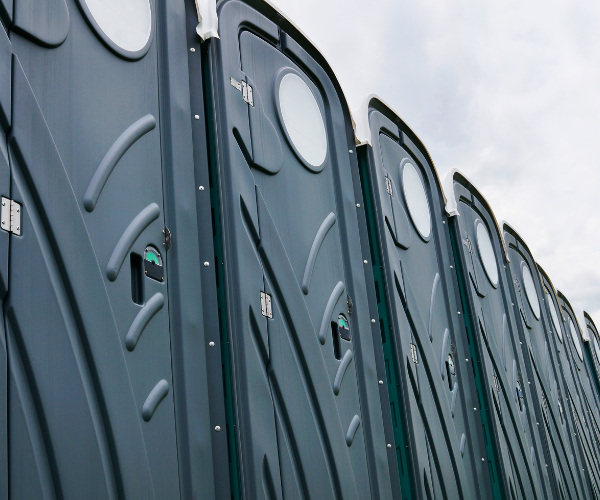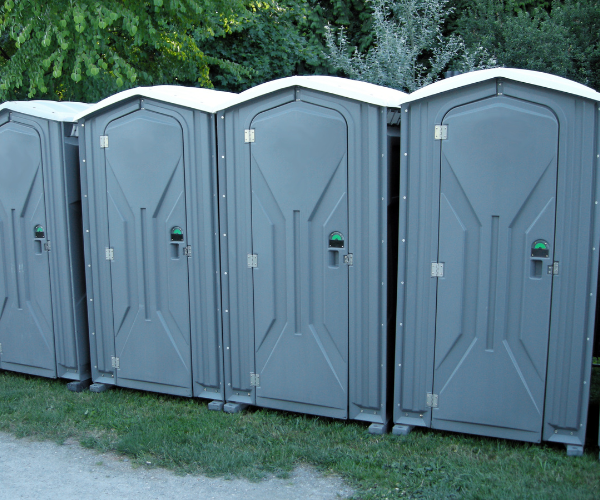Portable toilets provide significant eco-friendly advantages that contribute positively to our environment. Firstly, portable toilets conserve water. Traditional toilets use several gallons of water per flush, while modern portable toilets operate without using any water. This reduction in water usage is crucial, especially in regions experiencing water scarcity. Furthermore, portable toilets prevent ground contamination. Instead of allowing waste to seep into soil and potentially contaminate waterways, portable toilets effectively contain and isolate waste until it's safely removed and treated. The treatment processes further enhance their environmentally friendly status. Once collected, waste from portable toilets is typically processed at sewage treatment facilities where resources like methane gas can be harnessed for energy, contributing to renewable energy production. In addition, the chemical treatments used in portable toilets have advanced significantly. Modern formulations minimize environmental impact by reducing or even eliminating harsh chemicals, making them safer for natural ecosystems. Offering flexibility in location, portable toilets play a key role in preserving delicate environments during events or construction. By providing sanitation facilities that can be set up anywhere, they prevent situations where attendees or workers might otherwise resort to environmentally damaging alternatives. Their mobility ensures that they leave minimal footprint, both literally and figuratively. Moreover, manufacturers are now focusing on using recycled materials in the production of portable toilets, reinforcing the cycle of resource conservation. Finally, they also aid in maintaining cleaner outdoor spaces by encouraging proper waste disposal, thereby preserving the aesthetic and recreational value of outdoor environments. In summary, by saving water, ensuring better waste management, and enhancing the cleanliness of natural surroundings, portable toilets unequivocally support environmental sustainability.

Portable Toilet Rentals in Tavares, Florida
Call today for a free quote (352) 660-8775
Portable Toilet
Fast, Easy, & 100% Free To Get Started
Over 20 Years Of Experience
For over 20 years, Porta Serve has been a trusted name in portable sanitation services in Tavares. Our deep-rooted community ties and commitment to delivering quality ensure that we meet and exceed the expectations of our valued customers.
Excellence in Customer Care
At Porta Serve, we place a strong emphasis on delivering quality service to every client. Our team is dedicated to providing solutions that meet your event or construction needs with courtesy and professionalism.
Prompt and Efficient Delivery
Count on Porta Serve for prompt and dependable portable toilet delivery. Our team sets up efficiently, ensuring your event in Tavares, Flordia proceeds smoothly and without a hitch.
Reliable Portable Toilet Solutions in Tavares, Florida
Call for a Free Quote Today
(352) 660-8775
At Porta Serve in Tavares, we pride ourselves on offering dependable and reliable portable toilet services. As a locally owned business, we understand the needs of our community and surrounding areas. Whether it's a construction site, festival, party, or wedding, we provide clean and well-maintained units. Our commitment to customer satisfaction ensures that every client receives excellent service. We extend our reach to neighboring areas, offering timely deliveries and flexible rental options tailored to your event's requirements. With our team of experienced professionals, you can expect nothing short of quality and convenience.


Standard Portable ToiletOur standard porta john rental units are durable and reliable for any commercial build site, housing development, public works project, or remodel job.Features include dome lighting, grated floors, and an “In-Use” locking mechanism for privacy and comfort.Regularly maintained, inspected, and cleaned by FusionSite at your location.

Wheelchair Accessible RestroomsDeveloped as an alternative to full ADA-compliant restrooms, the Liberty is a spacious, wheelchair-accessible unit that can also be promoted as a family-sized restroom.Includes a patented flat-floor system for easy wheelchair access and maneuverability.Handrails, paper holder, and rotary latch are designed for simple, intuitive end-user operation.

Portable SinkPortable hand washing stations are essential for keeping your work site sanitary and clean.Features hands-free foot pumps, liquid soap, and paper towels.Perfect for job sites without water hookups, these units can handle hundreds of washes between services.
We Proudly Serve
Standard Portable Toilets
Porta Serve offers standard portable toilets ideal for a variety of outdoor events and worksites in Florida.
High Rise Portable Toilets
Our high-rise portable toilets provide elevated sanitation solutions for construction projects in Tavares.
Restroom Trailers
Restroom trailers from Porta Serve offer spacious, luxurious solutions for events in Tavares.
Roll off Dumpsters
Porta Serve provides roll-off dumpsters for efficient waste management in Tavares.
Septic Tank Cleaning
Porta Serve specializes in professional septic tank cleaning services throughout Florida.
Grease Trap Cleaning
Our grease trap cleaning services in Tavares ensure kitchens run smoothly and comply with local regulations.
Fencing & Barricades
Porta Serve offers reliable fencing and barricade services, enhancing safety for events in Florida.
Residential Storage
Secure and convenient residential storage solutions available at Porta Serve in Tavares, Florida.
Tavares Portable Restroom Solutions
Obtaining a quote and arranging for the delivery of a Portable Toilet with Porta Serve is straightforward and stress-free. Our user-friendly system allows you to request a quote online or contact us directly. Once the order is placed, our team ensures swift delivery, often available within 24 hours. Tailoring services for every occasion, whether it's a bustling construction site or an intimate wedding, we adapt to your schedule and site requirements. Our extensive fleet of new and well-maintained units is always at your service, each equipped with modern amenities for hygiene and comfort. Clients appreciate our attention to detail and commitment to promptness, making it convenient for Tavares residents to secure top-notch portable sanitation. Whether planning a large festival or a private backyard gathering, you can rely on us to deliver and install units exactly as scheduled, ensuring your event proceeds seamlessly. Trust in Porta Serve for all your portable restroom needs, backed by our legacy of reliability and professionalism.

Nestled in the heart of Tavares, our Portable Toilet services provide the perfect solution for local events celebrating the allure of outdoor spaces. With iconic America’s Seaplane City and vibrant events like Planes, Tunes & BBQ, Tavares hosts a variety of community gatherings. In this lively setting, our clean, reliable, and convenient toilet rentals are essential for enhancing the guest experience. Imagine hosting a festival by Lake Dora or a family reunion at Wooton Park—places where Tavares's natural beauty merges seamlessly with expertly organized events, supported by our top-tier portable sanitation solutions. Our stellar reputation is reflected in our consistent service quality, ensuring every unit remains well-stocked and maintained to the highest standards. As Tavares grows as a hub for outdoor activities and community events, Porta Serve is dedicated to meeting the evolving needs of our clients. Our locally-driven approach allows us to offer personalized services that resonate with this close-knit community's unique character.
Porta Serve excels in Tavares as the premier provider of portable restroom solutions, dedicated to both quality and excellence. With a solid reputation for reliable service built over decades, our team keenly understands the needs of the local community. Focusing on convenience and cleanliness, our services are designed to elevate any event or construction project, consistently ensuring client satisfaction. We proudly support local businesses and event planners, highlighting Tavares as a vibrant and welcoming destination. From booking to final retrieval, our unwavering commitment to customer care secures our position as the top choice for portable toilet rentals in the area.
Speed and reliability define Porta Serve's portable toilet services, ensuring that your needs are met with precision. With a well-coordinated logistics team, we provide timely deliveries to all areas in and around Tavares, supported by an extensive fleet of modern units. Our rapid response to service requests sets us apart, making us the preferred partner for local events and construction projects. Whether catering to large festivals or intimate gatherings, we prioritize efficiency without compromising on the quality of our units, guaranteeing that sanitary facilities are up and running exactly when required.
Discover More About Our Tavares Portable Toilets
Renting a portable toilet in Tavares is made simple through our intuitive processes at Porta Serve. Start by visiting our website where you'll find 'Get A Quote' buttons prominently positioned across various pages for easy access. Upon clicking, you will be guided to a form asking for details such as your first name, last name, phone number, and email. This process is designed to ensure that we have all the necessary information to serve you efficiently and effectively. Our team is prepared to assist you throughout the rental process, offering professional advice on the ideal units and quantities based on your specific event or project requirements. With years of experience under our belt, we are adept at managing the logistics required to provide timely and reliable delivery services. Once your rental request is processed, expect our team to reach out, offering tailored solutions aimed at enhancing the success of your event or project. From small family gatherings to large-scale construction jobs, our versatile range of units cater to a multitude of needs—proving we have the expertise and capacity to handle varied requests. We also offer on-site consultations to ensure your venue or site maximizes the value of our services. After submitting the form, our professional staff will follow up with a detailed quotation and answers to any queries you might have. As part of our commitment to customer service, we also entertain calls for immediate inquiries—just dial the number listed, and one of our friendly representatives will assist you in walking through the process. Simplifying operational workflows and emphasizing client convenience allows us to make renting a portable toilet in Tavares a straightforward experience, tailored to meet and exceed expectations.
Understanding the importance of timely delivery is key to meeting your event or project needs. At Porta Serve, we pride ourselves on our ability to provide portable toilet deliveries promptly and efficiently. Typically, the delivery timeframe for our portable toilets depends on the order's size and location specifics, but standard service typically sees units delivered within 24 to 48 hours of placing the order. We employ a skilled logistics team dedicated to coordinating delivery schedules that precisely align with your event timelines and setup requirements. This allows us to ensure that every unit arrives promptly, fully stocked, and in pristine condition. Our forward-thinking approach to logistics management guarantees minimal delays even during peak seasons, such as local festivals or construction surges. In certain circumstances, we can accommodate same-day delivery requests, ensuring that urgent needs are met without causing disruptions. Timeliness is prioritized through meticulous planning and coordination that accounts for potential challenges, thus allowing us to uphold our promise of exceptional service. Furthermore, real-time tracking options are available, providing you with updates on your order's status, ensuring peace of mind and the ability to monitor progress. This system ensures transparency and efficiency, confirming our commitment to your satisfaction. Whether you have scheduled a delivery to a remote location or within a bustling center, expect our team to execute the task with precision and reliability. Trust Porta Serve to provide the assurance and consistency needed in delivering high-quality portable toilet services tailored to meet the demands of clients across Tavares. Through our structured framework geared towards excellence in service delivery, we continue to build on our legacy of reliability and customer satisfaction.
Yes, we are equipped to service a diverse range of events and construction services with our comprehensive portfolio of products and expertise. From bustling festivals, vibrant sporting events, elegant weddings, corporate gatherings, to intimate family reunions, our versatile offerings cover all your sanitation needs. We also excel in providing services tailored to the unique demands of construction sites, ensuring the availability of functional, sanitary, and convenient units. Our inventory boasts a variety of options including luxury restroom trailers, standard porta potties, roll-off dumpsters, fencing, barricades, CAD (computer-aided design) units, portable sinks, and hand sanitizer stations. Each product is thoughtfully selected and maintained to deliver the best experience during busy events or intense construction phases. Our luxury trailers offer a premium experience with amenities that rival those of traditional restrooms, which are particularly beneficial for high-profile or upscale events. Additionally, ADA-compliant units ensure accessibility for all attendees, reflecting our commitment to inclusivity and service excellence. Regardless of the event scale or site complexity, our flexible rental terms and customizable service packages equip us to handle any requirement with efficiency and dedication. Porta Serve's seasoned team of professionals assists in meticulous event planning, ensuring that all logistics flow seamlessly and that waste management is handled effortlessly. From initial consultation to setup and maintenance, we offer comprehensive solutions that cater specifically to your site's layout and anticipated guest volume. Every detail, from delivery to pickup, is handled with care, guaranteeing that your event or project is supported by impeccable sanitation facilities that exemplify the community spirit and dedication that Porta Serve stands for.

